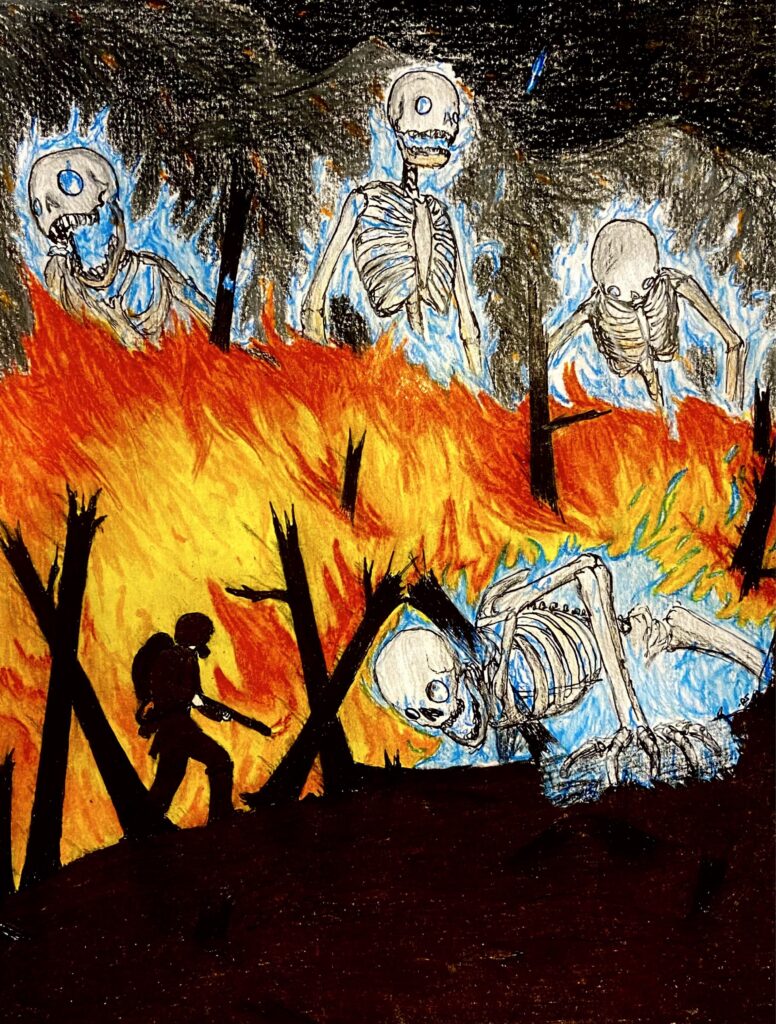Singed Spirits
Jeffrey Lee | Art by Ronald Sit

The smoke touches everything. It spills from the dead—the dead trees, the dead grass, the dead dirt, the dead bodies— and swells over the barren field. Snaking its way through the barbed wire, the smoke sinks into the trenches, which are mired in the mud. At first, when everything was just beginning, the smoke was white. It billowed from the greenery that garnished the soil and danced into the skies before entangling with the clouds. Things were more noble back then. Now, the smoke is black. That’s what happens when you burn too much and kill too much, there isn’t anything living left to burn so it just burns death. And now, the smoke is black with death.
I clutch the rifle close to my chest as I peer over the edge of the trench, watching the smoke roll across the field. With the smell of rain still lingering in the air, mixing with the bitter smoke, the battlefield looms overhead menacingly— an impending storm. I turn around and glance at the other men, who are preparing for tomorrow’s attack. Ernest, John, and William are inspecting their weapons; Charles and Joseph, as usual, are playing cards; Henry, with an evident scowl etched in his eyes, is busy cleaning out the latrines. Apparently, all we will be doing is charging into the enemy’s trenches and doing whatever we can to change things up. But that’s about it. After several weeks without any action, all we could want is for something to change. Change is all we could hope for.
The whole world, the earth, demands for smoke. It can’t get enough of it. Churning from the blackened bodies, bleeding into the blackened skies, falling onto the blackened fields— it isn’t enough and never will be. But the smoke must come from somewhere. The bodies must come from somewhere. The black smoke, the smoke of death. Where did it all come from? It could only be that. The fire. The fire that spills from the mouth of war and onto the battlefields and into the trenches. The fire that flows like blood, like melted flesh. Fire that burns. Fire that destroys. Fire that kills. Fire that punishes.
I look back at the approaching storm clouds; the smoke surges forward, engulfing the land in its wake. Suddenly, amidst the smoke, I briefly discern a silhouette resembling that of a human. I feel my body tremble by reflex, and, impulsively, I look behind me. But before I can warn the other men, a devastating roar erupts from all sides. Flames spill into the trenches as the sounds— those harrowing sounds— reverberate through my skull. I crawl to the other side of the trench and clamber out hastily, clawing desperately at the mud as loose scraps of wood and metal tear cruel gashes on my hands and on my knees. The flames lick eagerly at my feet as I make my way out of the trenches— bruised, burnt, and bleeding.
Fires, like all life, live off of life. Without life, the initial spark would sputter and die off: a valiant and admirable attempt at survival, but ultimately meaningless. Futile, it would all be futile. However, when there is air and when there is life— someone to kill— the flames can persist; they can breathe, they can roar, they can live, they can destroy. Life can only exist through the destruction and death of others. Is that not pitiful? Is that not wonderful? Yet, unfortunately, not all is destroyed. There will always be ashes. There will always be bones. There will always be remnants of the dead left behind: a reminder for the living. Is that not terrible? Is that not admirable?
I watch as the flames flood the trenches, spill over the edges, and bleed into the fields. The flames gather around me, threatening me with their deafening roar. The black smoke follows, swarming me with soot and stray embers, suffocating me. I clutch the sides of my head and cower in terror. Surely it must end, I think to myself, but I know that there is more— there has always been more. There were always remnants after the fires. The flames were now taunting me, sneering at me, as they knew. From the ashes of the flames, humanoid forms begin to take shape. Trembling, quivering bones clumsily piece themselves together until they become the distinct shapes of humans. The feeble, fragile structure of men is all that’s left, and they can only writhe in the unforgiving flames. I can only watch. I can only watch as the bones emerge from the flames. I can only watch as they march through the inferno and grasp hopelessly at my uniform— seeing without sight, screaming without sound, feeling without flesh. Their searing fingertips dig into my legs, my arms, and my chest. I can only bask in this excruciating pain, this exquisite punishment. I can only watch. But just as I glimpse the singular figure, the pitiful blackened skeleton of a man, dragging its fleshless corpse through the scorched earth, I can watch no more. My friends, how I have failed, I can no longer find the will to feel.
It appears as if the soldier has gone numb. Look at him, standing alone in that empty field. No man’s land: the land of the dead, the lost, and the weary. He stands alone, seeing nothing, hearing nothing, breathing nothing, feeling nothing, perceiving nothing. He stands there in a daze, with nothing left and without even the meager knowledge of the self. How pitiful. How wonderful. How terrible. How admirable. Having finally escaped the inferno— ah, it truly is a wonderful world.
